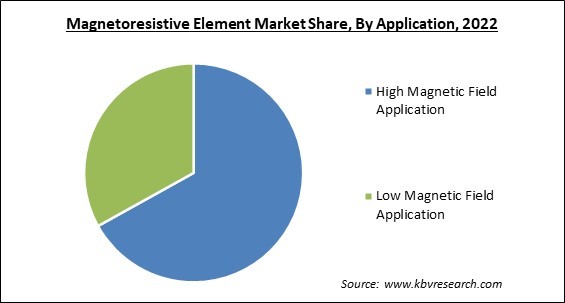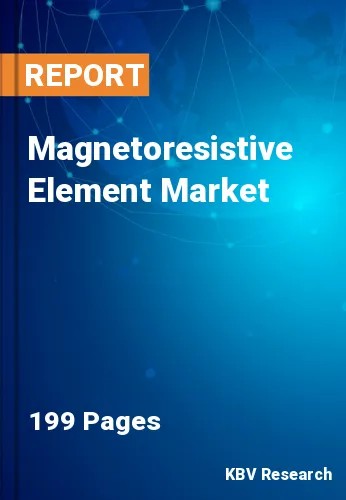The Global Magnetoresistive Element Market size is expected to reach $3.3 billion by 2030, rising at a market growth of 5.5% CAGR during the forecast period.
North America is the emerging region in magnetoresistive elements due to major regional market players and rising R&D spending in the technology sector. Consequently, North America acquired $556.1 million revenue in the market in 2022. Further expected to support the regional market expansion in the coming years is the growing desire for quicker computation, improved scalability, and lower power consumption. Additionally, Due to its highly developed infrastructure and end-use industries, the United States is one of the main countries responsible for creating demand. The use of drones by the US air force and other military systems, for instance, will raise the need for magnetoresistive elements in the country. Some of the factors impacting the market are the growing prevalence of consumer electronics, augmentation of industrial automation prevalence, and availability of alternate and efficient technologies.

Among the many different forms of technology consumer goods found in households, demand for electronic equipment is particularly high. Businesses emphasize the creation of products that are both high-performing and simple to use in response to the growing demand from customers. There has been a constant rise in demand for magnetoresistive materials due to the widespread use of smartphones, tablets, wearables, and other consumer electronics. Compass sensors, touchscreens, and hard disk drives are just a few of the applications that utilize these components in these gadgets. Therefore, the increasing demand for consumer electronics is propelling the market's growth. Factory automation is largely used in the industrial sector to ensure quick turnaround and precise assembly. Numerous countries, including the US, China, Italy, South Korea, and Germany, have highly automated factories. Since magnetoresistive elements provide benefits required by contemporary production processes, the demand for them is expected to rise over the projection period as more industrial processes move toward automation.
However, alternative detecting technologies, including reed sensors, Hall effect sensors, and giant magnetoresistance (GMR) sensors, compete with magnetoresistive elements in certain applications. Magnetoresistive element adoption is hampered as these substitute technologies provide equivalent or superior performance at a lower cost. The demand is also decreased by the availability of these alternatives and their widespread adoption by industry. Therefore, the broad availability of alternatives can prevent the market from expanding.
Based on application, the market is characterized into high magnetic field application and low magnetic field application. The high magnetic field application segment garnered the highest revenue share in the market in 2022. Magnetoresistive materials' sensitivity can be considerably increased by strong magnetic fields. Accordingly, they are useful for precise measurements and sensing applications since they can detect even smaller changes in the magnetic field. These elements often react more quickly when exposed to stronger magnetic fields.

On the basis of vertical, the market is classified into consumer electronics, automotive, industrial, aerospace & defense, and healthcare. The automotive segment recorded a significant revenue share in the market in 2022. The automotive sector is being significantly impacted by several megatrends. These include the development of autonomous vehicles and fleets, the utilization of data from car-sharing initiatives, connected vehicles, initiatives for alternate forms of transportation on demand, and of course, the paradigm shift in the automotive industry toward electric vehicles.
| Report Attribute | Details |
|---|---|
| Market size value in 2022 | USD 2.1 Billion |
| Market size forecast in 2030 | USD 3.3 Billion |
| Base Year | 2022 |
| Historical Period | 2019 to 2021 |
| Forecast Period | 2023 to 2030 |
| Revenue Growth Rate | CAGR of 5.5% from 2023 to 2030 |
| Number of Pages | 199 |
| Number of Table | 270 |
| Report coverage | Market Trends, Revenue Estimation and Forecast, Segmentation Analysis, Regional and Country Breakdown, Companies Strategic Developments, Company Profiling |
| Segments covered | Application, Vertical, Region |
| Country scope | US, Canada, Mexico, Germany, UK, France, Russia, Spain, Italy, China, Japan, India, South Korea, Singapore, Malaysia, Brazil, Argentina, UAE, Saudi Arabia, South Africa, Nigeria |
| Growth Drivers |
|
| Restraints |
|
Region wise, the market is analyzed across North America, Europe, Asia Pacific, and LAMEA. The Asia Pacific segment garnered the maximum revenue share in the market in 2022. Over the course of the forecast period, the Asia Pacific market is anticipated to grow rapidly. This is due to the expansion of the consumer electronics and automotive industries in the region, as well as the presence of major suppliers of magnetoresistive elements in Japan and China. The demand in Asia Pacific is also boosted by rising demand for luxury cars and high-end smartphones.
Free Valuable Insights: Global Magnetoresistive Element Market size to reach USD 3.3 Billion by 2030
The market research report covers the analysis of key stake holders of the market. Key companies profiled in the report include Robert Bosch GmbH, TDK Corporation, TE Connectivity Ltd., Cubic Sensor and Instrument Co., Ltd., Alps Alpine Co., Ltd., Honeywell International, Inc., Analog Devices, Inc., Crocus Technology, Inc., Avalanche Technology Inc., Micron Technology, Inc.
By Vertical
By Application
By Geography
This Market size is expected to reach $3.3 billion by 2030.
Augmentation of Industrial Automation Prevalence are driving the Market in coming years, however, Availability of Alternate and Efficient Technologies restraints the growth of the Market.
Robert Bosch GmbH, TDK Corporation, TE Connectivity Ltd., Cubic Sensor and Instrument Co., Ltd., Alps Alpine Co., Ltd., Honeywell International, Inc., Analog Devices, Inc., Crocus Technology, Inc., Avalanche Technology Inc., Micron Technology, Inc.
The expected CAGR of this Market is 5.5% from 2023 to 2030.
The Consumer Electronics segment is leading the Market by Vertical in 2022; thereby, achieving a market value of $1.8 billion by 2030.
The Asia Pacific region dominated the Market by Region in 2022 and would continue to be a dominant market till 2030; thereby, achieving a market value of $1.5 billion by 2030.
Our team of dedicated experts can provide you with attractive expansion opportunities for your business.

